A study has found that more middle aged women than expected are suffering from eating disorders.
And experts say that it might be caused by emotional trauma that occurs later in life - like divorce.
They have warned that women in their 40s are in danger of developing anorexia or bulimia if their marriage breaks down or if one of their parents dies.
The British study, undertaken by University College London and Icahn School of Medicine in New York, found that 15% of middle aged women have suffered from an eating disorder at some point in their life, and of those, almost a quarter of them experienced the issues within the past year.

Although eating disorders are more commonly associated with teenagers, Rebecca Field from eating disorder charity Beat){href='http://%5Btext%5D(http://https://www.b-eat.co.uk)' target='_blank' rel='noopener noreferrer'} commented: "Eating disorders come at all ages, not just for people under the age of 18, and there are many life changes like divorce and bereavement which happen to people in later life and can act as triggers.
"One environmental factor might be changes in normal daily life and routine. The anxiety from these changes could lead to an eating disorder."
The research also suggested that some people may be more likely to develop an eating disorder - perhaps having a biological or genetic predisposition which comes to light when the sufferer is affected by a sudden change.
The researchers surveyed around 5,300 British women for the study, and found that women who were in their forties had a higher risk of developing bulimia if they did not receive much affection from their mother. The death of a parent in childhood made someone seven times more likely to develop the disorder.

Lead author Dr. Nadia Micali, from University College London, said that for those who develop an eating disorder in later life: "Eating disorders can be set off by one of a number of traumatic events – and divorce is certainly a stressful experience.
"What we found from our study is that women who are suffering an eating disorder are not accessing healthcare services. They are suffering in silence, possibly because they do not realise many other women are in the same boat. By being made aware of this, we hope they will be more likely to seek help."
If you think you may be at risk, you can contact Beat through their websiteor on 0345 634 1414.
Have you or someone in your family ever been affected by an eating disorder? If you have and are happy to share your story, please get in touch via Facebook and Twitter.
Read more like this:
Diabulimia sufferer reveals in warning to others: 'My eating disorder left me blind'
McFly's Tom Fletcher on secret eating disorder battle: ‘My children saved me’
Helen Flanagan opens up about past anorexia battle on Instagram
